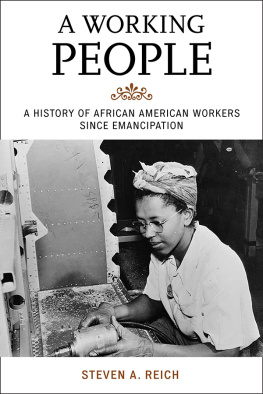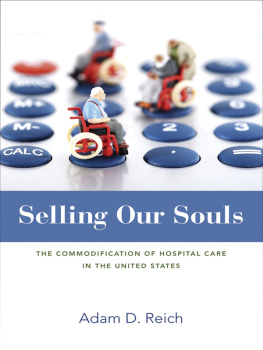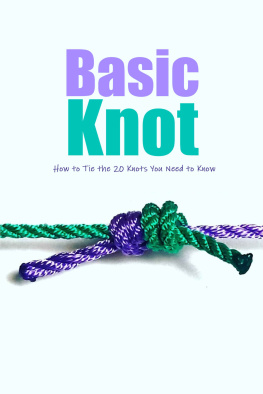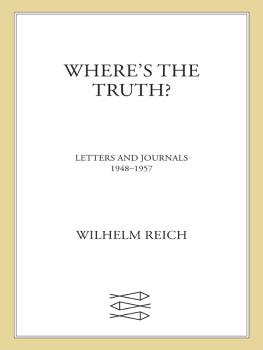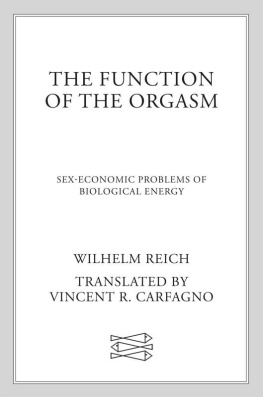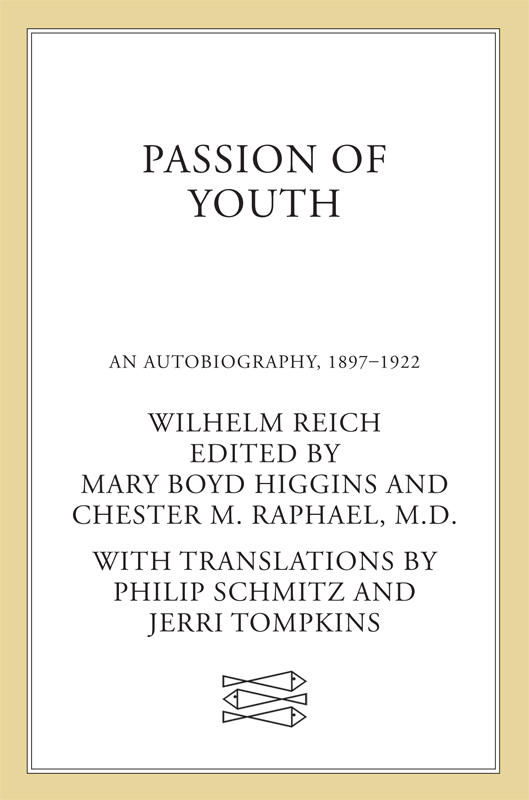
The author and publisher have provided this e-book to you for your personal use only. You may not make this e-book publicly available in any way. Copyright infringement is against the law. If you believe the copy of this e-book you are reading infringes on the authors copyright, please notify the publisher at: us.macmillanusa.com/piracy.
Contents
Preface
We rarely catch a glimpse into the process by which great men develop, or experience intimately their passion, and their pain. Only the finished productthe mature person, the objective workis presentable. Feelings of sexual need and desire, of love and hate, of longing, despair, frustration, and confusion lie buried in secrecy. Mans penchant for gossip and malicious intrusion may well express his need, however distorted, to break through this wall of secrecy and to learn the truth about his world and the great men and women whose lives thrust it forward.
Wilhelm Reich was well aware of the danger implicit in this truth in a world that was not ready to listen. But he was firmly convinced that it was essential to preserve it. In 1919, as a twenty-two-year-old medical student, Reich began to keep diaries and, during that same year, he wrote a recollection of his childhood and youth. Later, in 1937, he recalled his experiences in the Great War and his medical studies at the University of Vienna. These writings are now made available in order to dispel the myths given currency by the various biographies that have appeared since his death and to keep faith with the basic mandate of his will: to safeguard the truth about my life and work.
In publishing this material, I have not lost sight of the essential: what Reich did, what he discovered, the tool of scientific knowledge he has placed in our hands. But, as a Nobel laureate remarked recently, Science is made by people.
Mary Boyd Higgins, Trustee
The Wilhelm Reich Infant Trust Fund
New York, 1988
We tell ourselves that anyone who has succeeded in educating himself to truth about himself is permanently defended against the danger of immorality, even though his standard of morality may differ in some respect from that which is customary in society.
S IGMUND F REUD ,
Introductory Lectures on Psychoanalysis
ONE
Childhood and Puberty
18971914
M Y C HILDHOOD
I was born in a small village as the first child of not unprosperous parents. My father was a farmer who, together with an uncle of my mothers, had leased a fairly large landed estate in northern Bukovina, the farthest outpost of German culture. From the beginning, my mother tongue was German, as was my schooling. My parents considered it very important that I not speak the Yiddish of the surrounding population; they regarded it as crude. The use of any Yiddish expression would bring severe punishment. The line separating my parents from the Orthodox Jews had a very material basis. In the agricultural business which my father ran, there were three types of workers: the daily workers, who were farmers from the surrounding villages; the farmhands, who were the paid employees in the business; and, lastly, the office workers, a number of whom were Jewsthe manager, the steward, the cashier, and so forth. My father was not only a so-called free spirit but, as the boss, he had to keep himself apart from the Ukrainian population as well as from the Jewish administrative staff. The structure of the business was absolutely hierarchical and patriarchal.
The Hebrew language, unlike Yiddish, was an expression of reverence for the old Jewish tradition, built on a history of some six thousand years. Thus, there existed a Jewish aristocracy and great importance was attached to ones lineage. My fathers father was famous as a very wise man. He, too, had been a free spirit, a thinker, who was held in timid regard by the Orthodox Jews but was highly esteemed by the Ukrainian farmers. He ran an agricultural establishment, but actually left business matters to his wife. He himself read many books, scolded the farmers, and counseled the women as best he could. He was, as they said, cosmopolitan and a kindly friend to the people. He adhered to the Jewish law, but only to avoid talk. Once, when I was about six, we visited him on the Day of Atonement, when Orthodox Jews fast. I was asked to call him from the prayerhouse to a meal. But they forgot to tell me to speak softly. I spoke loudly and in front of everyone. There was a great fuss and my father spanked me.
My father had invested all his liquid assets and received the major portion of his outside financial support from my great-uncle, who was already a wealthy man. Father was a modern person, and even though he was never reckless with money but was rather shrewdly frugal, he had to work very hard so as not to fall behind financially while still keeping up a comfortable home.
A second child arrived a year after me; it was a girl, but she died soon after birth. Two years later, my brother, Robert, was born and, as his birth was also a difficult one, it became necessary for my mother to be away at a spa on two or three occasions.
It is from this date that my recollections begin to grow clear. There is one scene which I can still envision vividly in all its detail: My brother must have been a year old, and I four. Mother was away and had left us in the care of the servants, a fact which was to play an important part in my later development, especially in regard to sexuality. We had three servants: a cook; a housemaid, who was a country girl; and a nurse for Robert. Father had gone to the city for the day on business and was not expected home until about ten oclock. My brother and I were playing in the kitchen on the bed of one of the servants. Suddenly my brother let out a scream. I was terrified, for I had a great fear of the beatings which were so amply meted out by my austere father. And at that moment Father did, in fact, come in and ask what had happened. Naturally, I could not answer; the nurse told all. As our family doctor (who was also the steward of our estate and had great practical experience in such matters) later stated, I had dislocated my brothers tiny arm. I can still see him lying there on the bed, dressed only in a baby shirt and screaming at the top of his voice.
Our steward reset the arm while I cowered in a corner, waiting for what was to come. However, to my great astonishment, it did not happen. My father only looked at me with that terrible expression which, even when I was older, made me tremble and which always heralded trouble.
I cannot remember my father ever having cuddled or treated me tenderly at that timenor can I recollect feeling any attachment to him (I should like to emphasize at that time ).
A second experience which either immediately preceded or followed the above and to which I attach great significance will serve to illustrate the first phases of my conscious sexuality.
As I have already mentioned, we children lived with the servants. Father was always away on trips, since he loved Mother very dearly and could not stand being at home when she was not there. Robert and I slept with his nurse, all in the same bed. I recall that, even then, women were a mystery to me. As proof of this, I offer the fact that I do not remember (nor has anyone ever mentioned) that I asked adults the well-known childrens questions such as Where do babies come from? etc. I do know very well, however, that I had been brooding over this and similar problems long before this period and had never asked those questions because I sensed something verboten.


